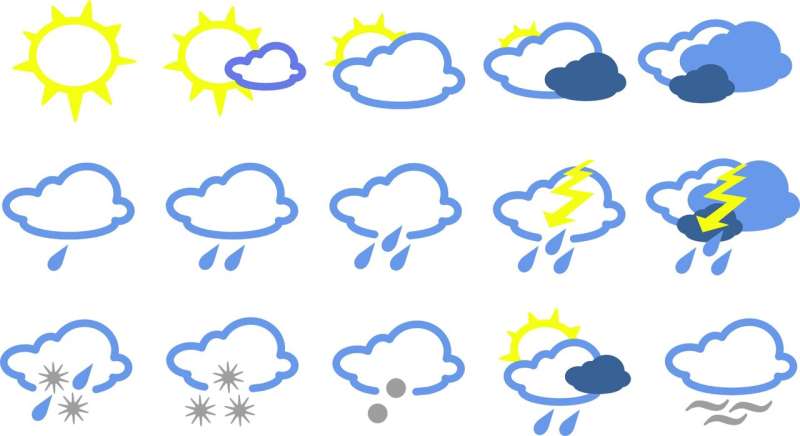This article has been reviewed according to Science X's editorial process and policies. Editors have highlighted the following attributes while ensuring the content's credibility:
fact-checked
proofread
Why it's hard to predict the weather

Will it rain tomorrow or will it be sunny? Better data and more computing power have made weather forecasts more accurate.
But doesn't it seem like, despite promises of a sunny summer, we'll still have to make contingency plans for indoor activities? Why is it so difficult to predict the weather? We've asked Nikolaos Kourentzes, a forecasting researcher at the University of Skövde.
With increased computing power and good data, weather forecasts have improved. But they are not infallible. Nikolaos Kourentzes is a professor of informatics at the University of Skövde and an expert in forecasting.
He has helped the International Monetary Fund develop forecasting tools for setting interest rates and has also worked with climate models and simpler statistical models of weather for applications in renewable energy.
Forecasts are better than we think
He believes we need to consider what we expect from forecasts. Short-term forecasts are usually based on large simulation models of weather. These can show how different parts of weather systems interact and affect each other. However, this information is usually distilled down to just a few key pieces of information for us weather amateurs, such as temperature and precipitation.
Forecasts may accurately show various weather data like solar radiation, wind, and air pressure, but if they slightly mispredict the temperature, many people dismiss the entire forecast.
Weather is a personal experience for many, and as weather amateurs, we lack precise definitions and metrics. How many raindrops are needed for you to consider it rainy? He illustrates this with an example.
"I'm from Greece, and even a small rain shower is too much, so I would say it's rainy in Sweden. But I have also worked in England, and my colleagues there would probably say it's very dry and beautiful weather in Sweden. My point is that without well-defined measurements that we can follow, personal experience will play a big role when we make statements about the accuracy of weather forecasts."
Forecasts are therefore better than we think. Moreover, as with all forecasts, we tend to remember the incorrect ones more vividly, such as when bad weather ruins a planned outdoor lunch. On the days before, when we are busy with work or other activities, forecasts can be very accurate without us noticing.
Complex models
Another aspect to consider is the complexity of the simulation models. Weather systems are chaotic, and our understanding of the physics behind them is still incomplete. Small errors can have significant impacts over time.
"Errors can easily creep into the simulation models. Because they are large models and chaotic systems, short-term forecasts are reliable, but as time goes on, the small error at the beginning can cause forecasts to be off in the long run."
Computing power and satellite data have done wonders for the quality of weather forecasts, but to get good long-term forecasts, other models may be needed—models that, in addition to physics, rely on AI and statistics about how the weather tends to behave.
'A gap in the research community'
To get even better forecasts in the future, Kourentzes believes that weather forecasters and "regular" forecasters need to meet and collaborate. Regular forecasting research rarely deals with weather forecasts because it is considered a matter for physicists rather than statisticians. He believes the truth probably lies somewhere in between.
"We should bridge this gap in the research community. Currently, the two groups don't understand each other when it comes to jargon and modeling methods. With our respective expertise, more computing power, AI, and a better understanding of physics, I am convinced that we can make even better forecasts in the future."
Provided by University of Skövde




















